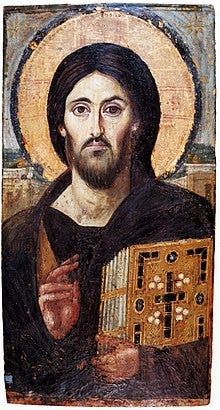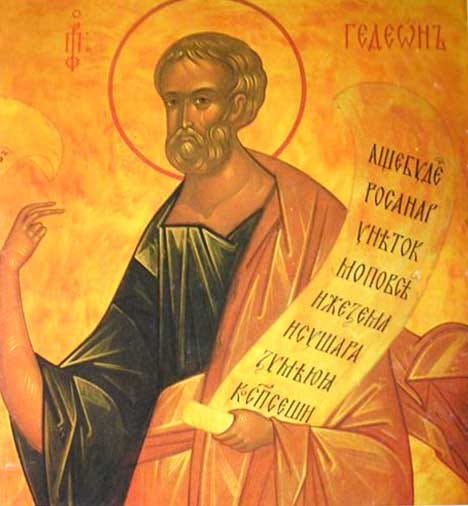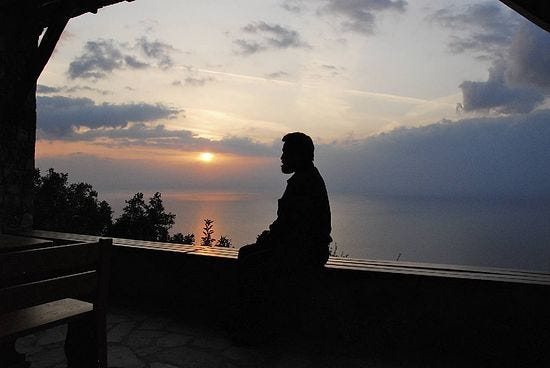"To be Orthodox means to have the God-man Christ constantly in your soul, to live in Him, think in Him, feel in Him, act in Him. In other words, to be Orthodox means to be a Christ-bearer and a Spirit-bearer."
- St. Justin Popovich
Daily Scripture Readings
1 Thessalonians 1:6-10
BRETHREN, you became imitators of us and of the Lord, for you received the word in much affliction, with joy inspired by the Holy Spirit; so that you became an example to all the believers in Macedo’nia and in Acha’ia. For not only has the word of the Lord sounded forth from you in Macedo’nia and Acha’ia, but your faith in God has gone forth everywhere, so that we need not say anything. For they themselves report concerning us what a welcome we had among you, and how you turned to God from idols, to serve a living and true God, and to wait for his Son from heaven, whom he raised from the dead, Jesus who delivers us from the wrath to come.
Luke 19:45-48
At that time, Jesus entered the temple and began to drive out those who sold, saying to them, “It is written, ‘My house shall be a house of prayer’; but you have made it a den of robbers.” And he was teaching daily in the temple. The chief priests and the scribes and the principal men of the people sought to destroy him; but they did not find anything they could do, for all the people hung upon his words.
The Righteous Gideon
The Righteous Gideon, whose name means “destroyer,” appears in chapters 6-8 of Judges. He was the son of Joash the Abiezrite. One day, as he was beating out wheat in the wine press, the Angel of the Lord appeared to him and commanded him to deliver Israel from the hand of Midian. Gideon gathered an army of men from various towns to fight the Midianites, then asked God to give him a sign that he would be able to deliver Israel. First, he placed a fleece of wool on the floor of the threshing room. Then he said, “If there is dew on the fleece alone, and if the ground is dry, then I shall know that thou wilt deliver Israel by my hand, as thou hast said.”
The next morning Gideon got up early and squeezed the fleece, wringing out enough water to fill a bowl. Then he asked God to let the fleece remain dry and to let there be dew on the ground. When Gideon saw that this had been done, the powerful warrior of Manasseh led an army of 300 men to victory over the Midianites.
The people entreated him to be their ruler, and also his son and grandson, but he would not agree to this, because the Lord was their ruler. However, Gideon was a Judge for forty years, and during that time the land had rest.
The Righteous Gideon is referenced in Ode 9 of the second Canon for the Feast of the Entry of the Most Holy Theotokos: “Let us all magnify the radiant cloud, in which the Master of all descended, as dew from Heaven upon the fleece” (Judges 6:37). He is also mentioned in Hebrews 11:32 with others “who through faith conquered kingdoms.”
A Time to Keep Silence
Fr. John Whiteford
In the Old Testament we read that there is “a time to keep silence and a time to speak” (Ecclesiastes 3:7). What is the value of silence and quiet in a time when we are always “plugged in”?
This passage is actually speaking about silence in terms of when we should speak. However, your question is more focused on silence in terms of removing distractions from our life, particularly for times of spiritual focus. Both aspects are important to consider.
What Ecclesiastes is saying is that there are times when we should speak, and there are times when we should not. There are times when we can betray God by speaking, and there are times when we can betray God by our silence. When to speak or when not to speak is a question of wisdom, and seeking the guidance of the Holy Spirit.
How does one acquire the wisdom needed to make the right choices? One thing we need to do is to inform ourselves by studying the Scriptures, which contain great wisdom. We should also seek wise counsel, and we should pray for divine guidance. And then, you have to make what seems to be the wisest choice, but remain open to the correction of others and praying that God will correct you, if you have made the wrong choice.
The Fathers say quite a bit about the virtues of silence. One good source to read on this is The Evergetinos, which is a compilation of sayings of the desert fathers, but arranged topically, by St. Nicodemus of the Holy Mountain. In volume 2, beginning on page 353, there is a section entitled "Concerning speech and silence, how and when to make use of them, and that idle talk is a sin." Here are a few excerpts from that section:
"An Elder said: "One man thinks that he is being silent, and yet his heart is judging others; such a man is always talking. Another man talks from morning until evening and yet keeps silence; that is, he says nothing that is not beneficial."
"A brother visited a certain Elder and said to him: "Abba, give me a word, so that I may be saved." The Elder replied: "If you go to someone, do not hasten to speak before you consider what you are going to say." Filled with compunction at this saying, the brother made a prostration and remarked: "Truly, I have read many books, but never have I come across such learning." Thus edified, he departed."
"Abba Isaiah said: "Wisdom does not consist in speaking; wisdom means knowing the time when you should speak and when to reply as necessary. Make it seem that you know nothing, although you have knowledge, so as to avoid great distress; for he who appears to have knowledge lays burdens on himself. Do not boast about your knowledge, for no one knows anything."
"An Elder says: ‘If you acquire silence, do not pride yourself on having attained to virtue, but say: I am unworthy even to speak.’”
From St. Diadochos: "Just as, when the doors of the baths are left continually open, the heat inside is quickly driven out, so also the soul, when it wishes to say many things, even though everything that it says may be good, disperses its concentration through the door of the voice. Hence, the soul, deprived of suitable spiritual ideas, loses the strength to struggle against thoughts and babbles with anyone it encounters. Since in this way (through loquacity) the soul drives out the Holy Spirit, it cannot keep the intellect free from harmful fantasies; for the Good Spirit always flees from loquacity, which is the cause of every upset and fantasy. Timely silence is good, since it is nothing other than the mother of the wisest thoughts."
"Two brothers from Sketis wanted to visit Abba Anthony. They embarked on a boat, and with them embarked a certain Elder, whom the brothers did not know and who was likewise going to visit Abba Anthony. As they sat on the boat, the brothers discussed what the Fathers say about the Scriptures and also talked about their handiwork. The Elder was silent. After they had disembarked from the boat and reached their destination, Abba Anthony said to the brothers: ‘You found good company in in this Elder.’ Then he said to the Elder: ‘You had good brothers travelling with you, Abba.’ The Elder replied: ‘They are good, but their house has no door; anyone who wants to can enter the stable and untie the ass.’ He said this in order to show that they said whatever came into their mouths."
Here are some thoughts on the question of distractions:
"There are a number of important things that should be observed by those seeking spiritual development. One of these is physical and mental quiet (hesychia), made possible by living in a quiet place [or turning off the TV at home, the radio in the car, etc.], away from noise, confusion, and distractions. Control of talking is another. Such control helps bring about inner silence, which strengthens a person spiritually, whereas unnecessary talking does the reverse" (Anchored in God: Life, Art, and Thought on the Holy Mountain of Athos, by Dr. Constantine Cavarnos).
"Silence greatly helps in spiritual life. It is good for one to practice silence for about an hour a day: to test himself, to acknowledge his passions and to fight in order to cut them off and purify his heart. It is very good if there is a quiet room in the house that gives him the feeling of a monastic cell. There, “in secret”, he is able to do his spiritual maintenance, to study, and to pray. A little spiritual study done before prayer helps greatly. The soul warms up and the mind is transported to the spiritual realm. That’s why, when a person has many distractions during the day, he should rejoice if he has ten minutes for prayer, or even two minutes to read something, so as to drive away distractions" (Excerpts from Family Life, by St. Paisios the Athonite).
We cannot avoid distractions all of the time, but we need to set aside times when we intentionally avoid them, so that we can make progress in the spiritual life. Great Lent is one tenth of the year. We should treat it as a tithe, and especially set this time apart for spiritual focus. This does mean we need to cut down the usual noise, and spend more time in prayer, more time reading the Scriptures and other spiritually edifying books, and more time in the services of the Church.
This week’s calendar reminders:
Monday 11/25: Matins 8:30 a.m.
Tuesday 11/26: no services or events
Wednesday 11/27: no services or events
Thursday 11/28: Thanksgiving Day Liturgy 8:30 a.m.
Friday 11/29: Paraklesis to Theotokos 8:30 a.m.
Saturday 11/30: Catechumen class 4:30pm; Great Vespers 6pm
Sunday 12/1: Divine Liturgy 9: 15 a.m.











